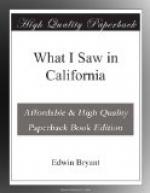Among the numerous vessels of many nations at anchor in the harbour is a Russian brig from Sitca, the central port of the Russian-American Fur Company, on the northwestern coast of this continent. She is commanded by Lieutenant Ruducoff of the Russian navy, and is here to be freighted with wheat to supply that settlement with breadstuff. Sitca is situated in a high northern latitude, and has a population of some four or five thousand inhabitants. A large portion of these, I conjecture, are christianized natives or Indians. Many of the crew of this vessel are the aborigines of the country to which she belongs, and from which she last sailed. I noticed, however, from an inscription, that the brig was built at Newburyport, Massachusetts, showing that the autocrat of all the Russias is tributary, to some extent, to the free Yankees of New England for his naval equipment. On the 11th of October, by invitation of Lieutenant Ruducoff, in company of Mr. Jacob and Captain Leidesdorff, I dined on board this vessel. The Russian customs are in some respects peculiar. Soon after we reached the vessel and were shown into the cabin, a lunch was served up. This consisted of a variety of dried and smoked fish, pickled fish-roe, and other hyperborean pickles, the nature of which, whether animal or vegetable, I could not determine. Various wines and liquors accompanied this lunch, the discussion of which lasted until an Indian servant, a native of the north-pole, or thereabouts, announced dinner. We were then shown into a handsomely furnished dining-cabin, where the table was spread. The dinner consisted of several courses, some of which were peculiarly Russian or Sitcan, and I regret that my culinary knowledge is not equal to the task of describing them, for the benefit of epicures of a more southern region than the place of their invention. They were certainly very delightful to the palate. The afternoon glided away most agreeably.
On the 12th of October, Captain Fremont, with a number of volunteers destined for the south, to co-operate with Commodore Stockton in the suppression of the reported rebellion at Los Angeles, arrived at San Francisco from the Sacramento. I had previously offered my services, and Mr. Jacob had done the same, to Commodore Stockton, as volunteers in this expedition, if they were necessary or desirable. They were now repeated. Although travellers in the country, we were American citizens, and we felt under obligation to assist in defending the flag of our country wherever it had been planted by proper authority. At this time we were given to understand that a larger force than was already organised was not considered necessary for the expedition.




